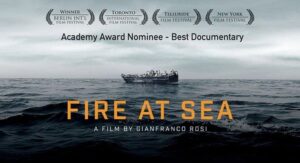Manohla Dargis, a New York Times film critic, describes Io Capitano (Italy, 2023, directed by Matteo Garrone) as “A Migration Odyssey,” but it is so much more than that. It is a bildungsroman or a coming-of-age story; a depiction of the Noble Savage or the glorification of native peoples living in communion with nature; it can also represent the mythical journey defined by Joseph Campell, and, most of all, it’s a contemporary tragedy of huge proportions.
At the beginning of the film, two Senegalese adolescents are planning to escape from Dakar to Europe. Seydou (Seydou Sarr) and Moussa (Moustapha Fall) are cousins, with strong family ties, especially their mothers. The suspense of the plot takes over immediately, even before they set out at night in what promises to be a tragic journey without a happy ending. The lack of a music score and the familiarity of the migration story accentuate the feeling that we are watching a documentary instead of a fictitious story. The contrast of the perils during the journey and the beauty and expanse of the natural world serves to ameliorate the experience of watching this “hard to watch” film. The young boys and the other anonymous companions travel by boat, by bus, on foot across the Sahara Desert, with a stop in a Libyan jail where they are tortured, and on a fragile ship in the open sea to their final destination in Sicily. In each of these situations there is always a noble Black person who helps Seydou survive. By the time their ship is rescued by the Italian Coast Guard, Seydou has become the hero and savior of his compatriots when he screams the words of the title “I Am the Captain.”
Seydou (Seydou Sarr) and Moussa (Moustapha Fall) are cousins, with strong family ties, especially their mothers. The suspense of the plot takes over immediately, even before they set out at night in what promises to be a tragic journey without a happy ending. The lack of a music score and the familiarity of the migration story accentuate the feeling that we are watching a documentary instead of a fictitious story. The contrast of the perils during the journey and the beauty and expanse of the natural world serves to ameliorate the experience of watching this “hard to watch” film. The young boys and the other anonymous companions travel by boat, by bus, on foot across the Sahara Desert, with a stop in a Libyan jail where they are tortured, and on a fragile ship in the open sea to their final destination in Sicily. In each of these situations there is always a noble Black person who helps Seydou survive. By the time their ship is rescued by the Italian Coast Guard, Seydou has become the hero and savior of his compatriots when he screams the words of the title “I Am the Captain.”
It is impossible to watch Io Capitano without thinking of Fire at Sea (Italy, 2016, directed by Gianfranco Rosi). Unlike a typical documentary, Foucoammare, is also the name of the suggestive music composed by Giuseppe Fragapane for this film, but there is no voice over narration or commentary characteristic of its genre. This film is almost a continuation of the one above; it’s about what happens to the migrants when they arrive to their destination, here Lampedusa, where over 400,000 Africans have landed in the last twenty years, without counting the 15,000 who have drowned in the Mediterranean.
 The documentary focuses on twelve-year-old Samuele (Samuele Pucillo) and his doctor (Pietro Bartolo) and their simple, slow lives in the island of Lampedusa in contrast with the unsurmountable struggles of the voyage through the Mediterranean, suggested as a graveyard. According to the rules of the European Union, the refugees are being processed and taken care of and placed in retention centers until they are allowed to stay. We see Muslims kneeling in prayer, women getting prenatal care in comparison with the birthing mother in Io Capitano’s ship.
The documentary focuses on twelve-year-old Samuele (Samuele Pucillo) and his doctor (Pietro Bartolo) and their simple, slow lives in the island of Lampedusa in contrast with the unsurmountable struggles of the voyage through the Mediterranean, suggested as a graveyard. According to the rules of the European Union, the refugees are being processed and taken care of and placed in retention centers until they are allowed to stay. We see Muslims kneeling in prayer, women getting prenatal care in comparison with the birthing mother in Io Capitano’s ship.
What a contrast with the situation at our Southern Border! What ever happened to the wet feet / dry feet policy of the Clinton years, when Cubans were welcome as long as they had touched US soil? Why can we welcome immigrants willing to do the jobs that their American counterparts don’t want to do? Why can we have a solid immigration policy that welcomes all and a common law as Europeans do? Wasn’t the United States supposed to be a nation of immigrants? Or are we willing to welcome only the privileged few who come in under the auspices of private agencies?
In today’s Spanish newspaper El País there is an article about families in El Hierro, one of the smallest Canary Islands, who welcome Senegalese children in their homes oftentimes adopting them before they have to be regulated by the government. Now, that’s an immigration policy one can be proud of!
